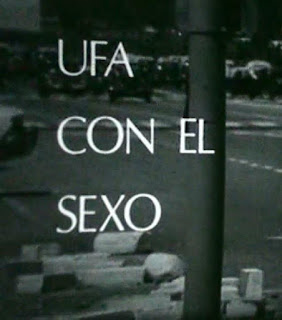 El presente artículo se propone analizar el film Ufa con el sexo (Rodolfo Kuhn, 1968) a partir de dos puntos de interés: en principio, se busca estudiar las razones que llevaron a que esta obra fuera prohibida por los organismos oficiales que respondían tanto al gobierno militar encabezado por el Gral. Onganía como a los sectores tradicionales del cine; en segundo lugar, el texto estudia las particularidades del traslado de un texto dramático a la pantalla y el modo en que este film expone cierta disolución de los límites tradicionales entre las distintas disciplinas. Construyendo vínculos con el absurdismo, apelando al “teatro expandido” y a referencias explícitas al café-concert y a otros espectáculos contrarios al realismo, este film inédito de Kuhn construyó un acercamiento novedoso a lo teatral.
El presente artículo se propone analizar el film Ufa con el sexo (Rodolfo Kuhn, 1968) a partir de dos puntos de interés: en principio, se busca estudiar las razones que llevaron a que esta obra fuera prohibida por los organismos oficiales que respondían tanto al gobierno militar encabezado por el Gral. Onganía como a los sectores tradicionales del cine; en segundo lugar, el texto estudia las particularidades del traslado de un texto dramático a la pantalla y el modo en que este film expone cierta disolución de los límites tradicionales entre las distintas disciplinas. Construyendo vínculos con el absurdismo, apelando al “teatro expandido” y a referencias explícitas al café-concert y a otros espectáculos contrarios al realismo, este film inédito de Kuhn construyó un acercamiento novedoso a lo teatral.
Abstract
The intent of this article is to analyze the film Ufa con el sexo (Rodolfo Kuhn, 1968) from two focus areas. Firstly, it tries to reveal the reasons why this work was banned by the government agencies that responded to both the military dictatorship lead by General Onganía and by the Instituto del Cine Establishment. Secondly, it studies the details and difficulties associatied with translating a dramatic text into the big screen, and the way this film somewhat dissolves the traditional boundaries between the two artistic disciplines.
Utilizing specific references to the theatre of the absurd, the “expanded teather”, and of other non-realistic theatrical expressions (like the music-hall), this unknown film of Roberto Kuhn built an unprecedented approach of theatrical techniques into the cinema.


